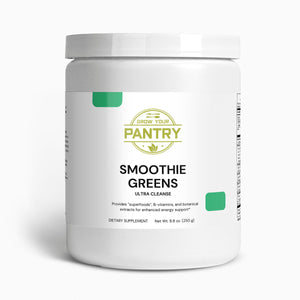Compost Starter: The Ultimate Guide
A compost starter serves to introduce bacteria and fungi, which break down organic matter eventually turning it into compost. Having a compost starter will ensure that decomposition takes place even if you don't have the right balance of organic matter, water, and air in your compost. This guide will take you through what a compost starter is, how it works, the best one to use, and how to speed up the composting process.
What Is A Compost Starter?
A compost starter is a mixture of additives that boost the decomposition process by providing the necessary bacteria and fungi cultures as well as the nutrients they need to feed on in order to grow and populate the rest of the compost heap rapidly to rapidly develop and populate the rest of the compost heap rapidly. Compost starters are often prepared using cow manure, plant extracts, clay, rock powder, and a blend of biodynamic compost preparations made from six specific herbs (Yarrow flowers, German Chamomile, Stinging Nettle, Oak bark, Dandelion flower, and Valerian flowers.
Compost Starter Vs. Accelerator Vs. Booster
Are They The Same?
Yes, compost starter, compost accelerator, and compost booster are all used to refer to the same concoction of additives that boost the decomposition process of organic matter into compost. These terms are often used interchangeably, depending on the manufacturer’s marketing strategy. Further reading material: link.
Benefits Of A Compost Starter
1. Accelerate Decomposition Rate
Adding a compost starter mix to your compost will repopulate it with the necessary bacteria and fungi cultures that break down organic materials. This leads to a drastic increase in the rate at which the organic matter gets decomposed and releases nutrients.
2. Populate The Compost With The right Microbials
Compost starter is packed full of useful bacteria and fungi that fight off harmful pathogens in the compost and later on in the soil that it gets mixed in. This reduces the probability of crop loss due to diseases.
3. Increase Compost Production
An increase in the population of bacteria and fungi culture in the compost results in a corresponding increase in the rate of decomposition. This results in total decomposition where most of the organic matter gets broken down into mature compost.
4. Increasing The Nutritional Value Of The Compost
Most compost starters include additional nitrogen, providing material to give the compost a nutritional boost. These nutrients eventually make their way to your plants after topdressing with the compost. Further reading material: link.
Considerations When Picking Your Starter
1. Cost
The cost of commercially sold compost starters ranges depending on the complexity of the blend of ingredients. It's important to note that expensive doesn't always translate to being the best - most of the premium compost starters don't offer additional benefits compared to competitively priced ones. It's recommended to do a price search online for various products and read customer reviews in order to get the best priced compost starter with actual benefits.
2. Preparation Time
Some compost starters require additional preparation steps before they can be applied onto compost. While this might not have a major impact when dealing with small loads of compost - it becomes an entirely different thing when dealing with bulk compost. Consider getting a compost starter that’s easy to prepare and apply.
3. Amount Of Compost Required
The amount of compost you are working on will dictate the amount and type of compost starter to get. If you are dealing with small scale compost such as organic kitchen waste you should consider preparing a DIY homemade compost starter as it's cost effective. On the other hand, large scale compost production will require bulk compost boosters.
4. Additional Content
Consider getting boosted compost starters - these contain extra nitrogen and essential mineral content. These nutrients feed the bacteria and fungi cultures which intrun breakdown the organic matter and release more nutrients into the compost. These will eventually get absorbed by the plants for increased yields.
Diy Compost Starter Recipe
Ingredients
- Cow Manure - 2 pounds
- Plant Extracts - 2pounds (shredded)
- Clay- 100 g
- Rock Powder- 100 g
Directions
- Mix the ingredients in a bucket and add extra water to halfway fill the bucket
- Poke holes 10 inches apart in the compost heap and pour in the compost starter. If you haven't piled up the compost, you can sprinkle the activator directly onto each layer of the compost as it gets piled up. Further reading material: link.
How To Use A Compost Starter
A compost starter should be sprinkled or applied on to the compost, after which it's mixed in by turning the compost with a shovel.
Common Questions
Do You Need A Compost Starter?
You only need a compost starter if you are dealing with unbalanced ratios of water to air and organic matter or when the compost is taking too long to decompose.
What Is A Good Compost Starter?
A good compost starter needs to be fast-acting and relatively inexpensive to obtain. A great example would be a mixture of cow dung mixed with shredded plant material.
How Do You Make A Compost Starter?
You can make a quick DIY compost starter by mixing water, beer, ammonia, and soda. The mixture is then sprinkled on the compost.
What Is Good For Using As A Compost Activator?
Farmyard manure collected from pigs, cows, horses, and chicken is a great alternative compost activator.
Can Banana Peels Go In Compost?
Yes, banana peels will naturally decompose when thrown into a compost pit, and they will not harm your plants.
Can Onions Go In Compost?
Yes, onions can go in the compost, but they do produce strong odors when rotting, which can attract pests to the compost heap, so avoiding adding a lot of them at a go.
Can I Pee On My Compost Pile?
Yes, you could pee on the compost pile; the urine will add nitrogen to the compost and other essential minerals.
Why Is Urine Good For Compost?
Urine is rich in nitrogen, which the plants need to grow vegetative material.
Can I Put Lime In Compost?
While you can add lime to the compost, it's not recommended to do so when dealing with mature compost.
What Will Make Compost Break Down Faster?
Shredding organic material in readiness for composition will significantly increase the surface area of the material that's exposed to water and air, thus breaking it down faster.
Should Compost Bins Be In The Sun Or Shade?
Compost bins should be kept in the sun, where the extra heat will hasten the bacteria and fungi activity for faster composting.
What Is The Best Compost Accelerator?
The best compost accelerator requires a combination of farmyard manure, shredded plant matter and rock powder.



